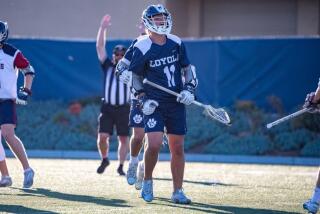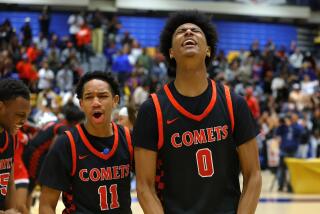Words That Can Last a Lifetime
- Share via
High school sports serve as a rite of passage for the athletes who play them, the students, friends and families that gather to watch them and the sportswriters who cut their professional teeth covering them.
High school football games in Los Angeles date to 1896, but it wasn’t until 1934 that the Los Angeles City Section was born.
The Southern Section was established in 1912 and held its first athletic competition in 1913.
This story is not an attempt to document the achievements of every outstanding athlete, coach and team that made a mark, for there are far too many to chronicle here.
Rather, it is a history lesson of sorts told by current and former Times staff writers who have written about Southland prep athletes. Most of the writers graduated from Los Angeles-area high schools. And while many have gone on to cover college and professional sports as beat writers or columnists, all maintain indelible images of the prep athletes they watched, covered and, in some instances, competed with and against on the playing field.
*
During 31 years at The Times, I wrote about thousands of winners and losers, from Olympic gold medalists and Super Bowl champions to second-string linemen laboring in the trenches of the Garden Grove League. I honestly can’t remember a single word that was said during the postgame din in the bowels of the Rose Bowl after the last Super Bowl I covered in 1993. But I’ll never forget a few sentences quietly spoken more than a decade earlier in a tiny high school weight room by a teenager with Attention Deficit Disorder.
His story is proof that merely competing in sports is often a precious victory.
When John Cross was 8, he came home one day with a very sore neck. Seems he had dived out of a tree with a milk carton on his head to impress the neighborhood kids. Since kindergarten, he had spent much of his time chasing playmates. Slow and chubby, he seldom caught them, but he beat the heck out of them when he did. He routinely ruined bicycles and shredded his skin by pedaling his bike to top speed and then bailing off the back to wow the other kids on the block. And there was the night he almost killed his sister, flinging a heavy chain at her head with all his considerable might.
Medication didn’t seem to help much, and nearly every day was fraught with new escapades. His parents struggled to cope, seeking help from doctors, educators and ministers. They went with him to Indian Guides, Cub Scouts and Boy Scouts, making every effort to divert the downward spiral that seemed certain to suck their son into juvenile delinquency . . . or worse.
Then, when Cross was 13--and, in his father Jack’s words, “clumsy, overweight and strong as a baby gorilla”--he made the cut for a youth football team after failing the year before. He was hardly a football hero, but when he traded the milk carton for a helmet, he felt part of something for the first time and began to feel comfortable inside his skin.
I met John Cross one afternoon when he was an 18-year-old defensive lineman working out before his senior season at Villa Park High. He was 6 feet 3, 230 pounds and had made second-team all-county as a junior. His teammates watched in awe as he leg-pressed 950 pounds.
He was shy and spoke softly about the whirlwind nightmare that was his childhood. As I stood to leave, he said, “I didn’t have a friend until I was in seventh grade. Just my mom and dad. I don’t know if this is possible, but could you mention somewhere that I said, ‘Thanks to Mom and Dad and I love you’ ”?
It was possible.
More to Read
Go beyond the scoreboard
Get the latest on L.A.'s teams in the daily Sports Report newsletter.
You may occasionally receive promotional content from the Los Angeles Times.










